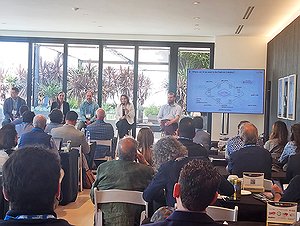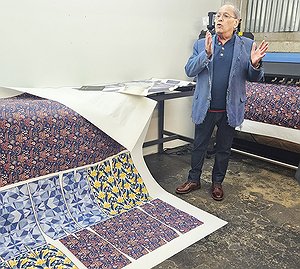TECHNOLOGY
SPESA L.A. Event Accents Worker Value as Technologies Advance
The Sewn Products Equipment & Suppliers of the Americas hosted its Advancements in Manufacturing Technologies Conference April 11 at the California Market Center in downtown Los Angeles, aiming to shift demand toward nearshoring options. SPESA President Michael McDonald has been a vocal supporter of gaining greater funding for the innovations in apparel.
“There are really cool startup technologies that could change the face of the industry, but you’re not getting Microsoft, Dell, GE or Airbus investing hundreds of millions or billions of dollars into the industry,” McDonald said during an interview with California Apparel News. “It’s all grassroots.”
McDonald further explained that apparel companies want to create a better apparel industry but don’t know where to start regarding new technology.
“How do we build out a better waste-management system? What technologies exist to support a concept in circularity? AI and circularity are novel topics in our industry,” McDonald explained. “A lot of the conversations I heard between people and the technology companies during the conference were regarding ‘how can you help me collect data?’”
Attendees were also afforded the opportunity to tour Tukatech’s Innovation Center and the vertical US Standard Apparel factory in Vernon, Calif., on April 12. Both Tukatech founder Ram Sareen and US Standard Apparel President of Manufacturing Marty Bailey participated in a panel covering “The Future of Garment Manufacturing in Los Angeles (And Beyond)” with Ilse Metcheck, founder of the California Fashion Association.
“The younger generation wants to be in fashion, but on the fashion side or technology side. In order to build a workforce to carry this industry forward, we have to incorporate technology that grabs people’s interest,” said Bailey in an interview with California Apparel News. “If you’re helping companies to be successful, then you’re helping members of the community, those professional apparel and textile workers, to be successful.”
Panelist Stephanie Choi, chief executive officer of Los Angeles–based Rewilder, participated in the panel “Sustainability in Garment Manufacturing.” Choi reflected on the conference experience and explained the pleasant surprise of discovering camaraderie with professionals from other areas of the apparel industry amid shared challenges.
“At the conference, I found there is this entire other world of people who know about [sustainability], have heard about it and care about it but might not have the same knowledge or background or experience working in the sustainability space. We’re all a part of this in our own respective siloes,” Choi said, speaking with California Apparel News.
The words of a fellow speaker and industry veteran resonated with Choi, “Ram said, ‘We are so lucky to have all of these resources here, but everyone is so engaged in their own lane; we’re slowly learning how to collaborate.’ My hope for the future is to accelerate that collaboration, not be so secretive and be in service of something greater than ourselves.”
As the apparel industry shifts to embrace a more collaborative course, Corinne Brothers, owner and designer of Los Angeles’ Rule Design & Development, also felt the change. Opening the conversation to include workers at every level of the industry left Brothers feeling hopeful after the event.
“Anybody that was promoting new manufacturing technology seemed open and engaged with pulling people in one on one,” Brothers explained. “We also had representatives from the Garment Worker Center, who are on the frontlines of representing small businesses and garment workers. There is a barrier to entry, and creating a welcoming environment felt inclusive and engaging.”
As workers fear threats to their jobs stemming from advancements in AI, panelists showed attendees how they can allay employee concerns through sharing plans for education and training.
“One of the most critical components to any of these systems, whether it’s automated machinery, a unit production system or shop-floor control—without the engineering or the training you’re left being inefficient with equipment or software that is designed to make it more efficient,” explained John Robinson, senior strategic account manager with Alpharetta, Ga.–based Aptean during the session, “Supply Chain Efficiency Across the Board: From the Factory Floor to the Global Supply Chain.”
Traveling from El Salvador, Alba Cruz, corporate engineering manager for New York–headquartered Garan Inc., was interested in learning more about Tukatech’s offerings. Cruz feels the potential for AI can allow workers to excel at their jobs and increase their skill sets. The technology needs human management to function, which means it will support worker advancement—not threaten it, according to Cruz.
“Instead of my operator sitting down and sewing, I am going to teach my operator how to feed the material into the machine, analyze information or perform quality control. This is going to challenge us to open our minds to bring up new jobs,” said Cruz. “You will have to program it. There will always be human assistance.”
AI’s reliance on humans places greater value on workers as they increase efficiency. During “A Conversation on Industry Evolution Part II: Artificial Intelligence,” vice president of marketing for Paris-based Lectra, Ketty Pillet, spoke about how these technologies can also reduce costs for apparel companies.
“Data learning helps us save—it’s good for waste, but it’s also good for the bottom line. When you save 2–3 percent of fabrics, you save money,” Pillet explained. “That is hundreds of thousands of dollars for some companies.”
























